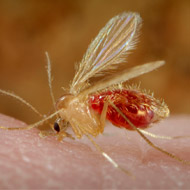
Researchers assess efficacy of Fipronil
The cattle insecticide fipronil could reduce leishmaniasis risk in humans, according to new research.
Transmitted by sand flies, leishmaniasis kills around 50,000 humans a year - the majority of which live on the Indian subcontinent.
Currently, indoor residual spraying is used to control the disease. But alternative methods - like the treatment of livestock with insecticide-based drugs - are being evaluated.
Writing in the journal PLOS Neglected Tropical Diseases, researchers assess the efficacy of the insecticide fipronil and show that it can significantly reduce the abundance of sand flies in environments where livestock and humans live in close proximity.
"Taking into account cost-effectiveness and logical feasibility, two of the most efficacious treatment schemes reduced population peaks occurring from April through August by 90 per cent," they write.
Fipronil-based drugs provide potential means of sand fly control by permeating in cattle blood and being excreted in cattle faeces, the researchers say. The drugs target adult females feeding on cattle blood and larvae feeding on cattle faeces respectively.
In the study, the team developed a model to represent sand fly population dynamics in a village in Bihar, India. The model included all developmental stages, with the aim of predicting the impact of various vector control strategies, utilising drug-treated cattle, on vector population numbers.
The team found that the success of fipronil treatment not only depends on the number of treatments applied annually but also on the seasonality of the sand fly lifecycle.
"Synchronising applications to maintain high efficacy of the drug in cattle faeces during the period of high larval abundance seems particularly important," they write.
"While more frequent applications obviously are more efficacious, they also are more expensive and more difficult logistically. Thus, the ability to assess not only efficacy of treatment schemes per se but also their cost-effectiveness and their logistical feasibility is of paramount importance."
Image (C) Centers for Disease Control/Frank Collins



 The veterinary mental health charity Vetlife is inviting the veterinary community to join it for a sponsored cold-water dip.
The veterinary mental health charity Vetlife is inviting the veterinary community to join it for a sponsored cold-water dip.